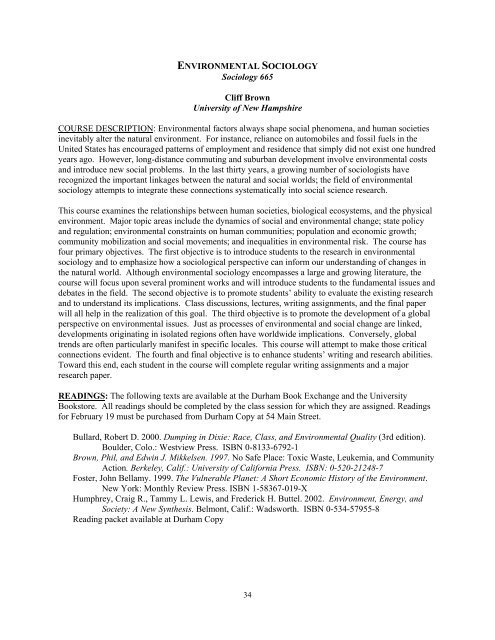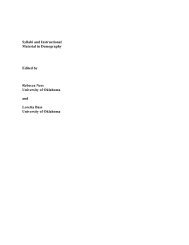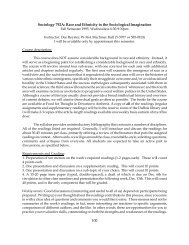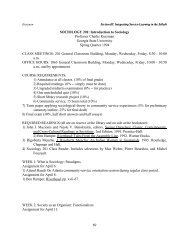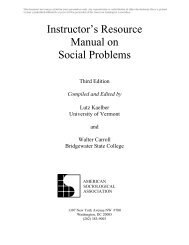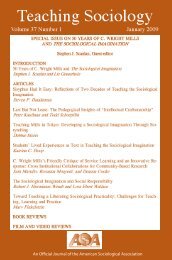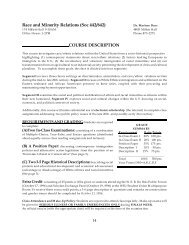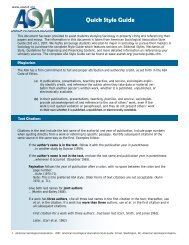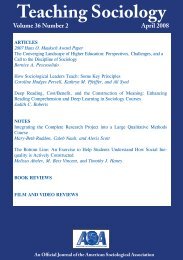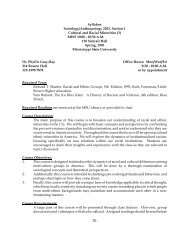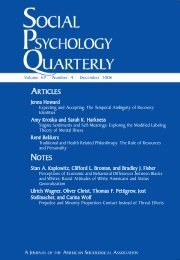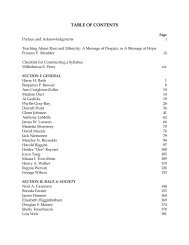Environmental Sociology - American Sociological Association
Environmental Sociology - American Sociological Association
Environmental Sociology - American Sociological Association
You also want an ePaper? Increase the reach of your titles
YUMPU automatically turns print PDFs into web optimized ePapers that Google loves.
ENVIRONMENTAL SOCIOLOGY<br />
<strong>Sociology</strong> 665<br />
Cliff Brown<br />
University of New Hampshire<br />
COURSE DESCRIPTION: <strong>Environmental</strong> factors always shape social phenomena, and human societies<br />
inevitably alter the natural environment. For instance, reliance on automobiles and fossil fuels in the<br />
United States has encouraged patterns of employment and residence that simply did not exist one hundred<br />
years ago. However, long-distance commuting and suburban development involve environmental costs<br />
and introduce new social problems. In the last thirty years, a growing number of sociologists have<br />
recognized the important linkages between the natural and social worlds; the field of environmental<br />
sociology attempts to integrate these connections systematically into social science research.<br />
This course examines the relationships between human societies, biological ecosystems, and the physical<br />
environment. Major topic areas include the dynamics of social and environmental change; state policy<br />
and regulation; environmental constraints on human communities; population and economic growth;<br />
community mobilization and social movements; and inequalities in environmental risk. The course has<br />
four primary objectives. The first objective is to introduce students to the research in environmental<br />
sociology and to emphasize how a sociological perspective can inform our understanding of changes in<br />
the natural world. Although environmental sociology encompasses a large and growing literature, the<br />
course will focus upon several prominent works and will introduce students to the fundamental issues and<br />
debates in the field. The second objective is to promote students’ ability to evaluate the existing research<br />
and to understand its implications. Class discussions, lectures, writing assignments, and the final paper<br />
will all help in the realization of this goal. The third objective is to promote the development of a global<br />
perspective on environmental issues. Just as processes of environmental and social change are linked,<br />
developments originating in isolated regions often have worldwide implications. Conversely, global<br />
trends are often particularly manifest in specific locales. This course will attempt to make those critical<br />
connections evident. The fourth and final objective is to enhance students’ writing and research abilities.<br />
Toward this end, each student in the course will complete regular writing assignments and a major<br />
research paper.<br />
READINGS: The following texts are available at the Durham Book Exchange and the University<br />
Bookstore. All readings should be completed by the class session for which they are assigned. Readings<br />
for February 19 must be purchased from Durham Copy at 54 Main Street.<br />
Bullard, Robert D. 2000. Dumping in Dixie: Race, Class, and <strong>Environmental</strong> Quality (3rd edition).<br />
Boulder, Colo.: Westview Press. ISBN 0-8133-6792-1<br />
Brown, Phil, and Edwin J. Mikkelsen. 1997. No Safe Place: Toxic Waste, Leukemia, and Community<br />
Action. Berkeley, Calif.: University of California Press. ISBN: 0-520-21248-7<br />
Foster, John Bellamy. 1999. The Vulnerable Planet: A Short Economic History of the Environment.<br />
New York: Monthly Review Press. ISBN 1-58367-019-X<br />
Humphrey, Craig R., Tammy L. Lewis, and Frederick H. Buttel. 2002. Environment, Energy, and<br />
Society: A New Synthesis. Belmont, Calif.: Wadsworth. ISBN 0-534-57955-8<br />
Reading packet available at Durham Copy<br />
34


